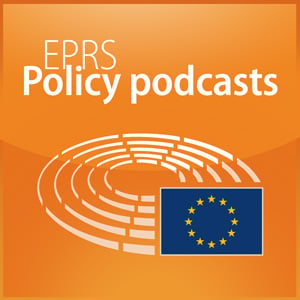The European Parliament's new Rules of Procedure: Parliament 2024 reforms
European Parliament - EPRS Policy podcasts
European Parliament Webmaster
4.8 • 13 Ratings
🗓️ 18 October 2024
⏱️ 5 minutes
🧾️ Download transcript
Summary
- Original publication on the EP Think Tank website
- Subscription to our RSS feed in case your have your own RSS reader
- Podcast available on Deezer, iTunes, TuneIn, Stitcher, YouTube
Source: © European Union - EP
Transcript
Click on a timestamp to play from that location
| 0:00.0 | Welcome to the European Parliamentary Research Service Podcasts. |
| 0:05.0 | In this podcast, we'll talk about the European Parliament's revamped rules of procedure. |
| 0:11.0 | It might sound like dry legal talk, but it's about improving the way Parliament adopts laws, |
| 0:16.0 | increasing its control of the EU budget and its oversight of the Commission. Want to know more? Stay with us. |
| 0:25.6 | Initiated by President Roberta Metzola and adopted by the Parliament in April 24, |
| 0:31.6 | the new rules came into force in July the same year, |
| 0:34.6 | just as the Parliament began its 10th legislative term. |
| 0:38.3 | In a nutshell, they'll strengthen Parliament's working methods, |
| 0:41.3 | institutional role and capacity to act. |
| 0:44.3 | But let's get into the nitty-gritty of this reform. |
| 0:47.3 | One of the main goals is improving the way in which files are attributed to committees and how they cooperate. |
| 0:56.0 | How? Essentially, by laying down new rules on how to solve conflicts of competence between them. |
| 1:02.0 | Under the new rules, Parliament's President will be able to refer proposals for legally binding acts |
| 1:07.0 | to up to three committees acting jointly, as well as to one or more committees to give an opinion. |
| 1:12.6 | Within two weeks of the referral, a committee or political group, unhappy with where the proposed law was initially sent by the President, |
| 1:19.6 | will be able to challenge that decision. |
| 1:22.6 | The Conference of Presidents will then decide on the final referral at its next meeting, and that should |
| 1:28.4 | settle the competence problem quickly. |
| 1:30.3 | In exceptional cases, and provided the plenary accepts, the Conference of Presidents |
| 1:34.8 | will also be able to suggest setting up a temporary legislative committee to deal with especially |
| 1:39.6 | broad issues that fall within the scope of more than three committees. And the Commission President will have to explain to Parliament why it wants to make a proposal |
| 1:49.0 | on the basis of the so-called Solidarity Clause. |
... |
Please login to see the full transcript.
Disclaimer: The podcast and artwork embedded on this page are from European Parliament Webmaster, and are the property of its owner and not affiliated with or endorsed by Tapesearch.
Generated transcripts are the property of European Parliament Webmaster and are distributed freely under the Fair Use doctrine. Transcripts generated by Tapesearch are not guaranteed to be accurate.
Copyright © Tapesearch 2025.

